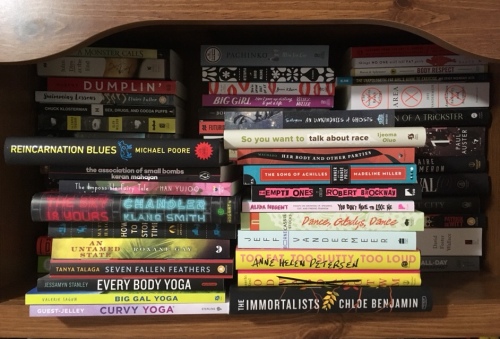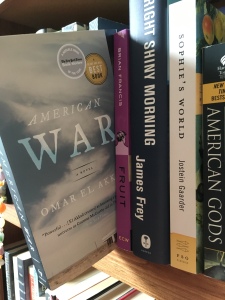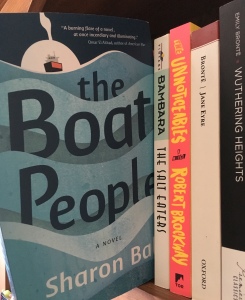It pains me to give a book a bad review. Disliking a book goes against what I know to be good and right with the world. I was so excited to jump into the Canada Reads shortlist but this will be the second book that has left me wondering what the judges are thinking. I’ll be interested to hear the debates for this book because I can’t imagine that this is representative of Canada’s best (non-fiction) writing.
About this book: I find the back cover copy to be overly flowery and misleading now that I’ve read the book. Precious Cargo‘s basic premise is that Craig Davidson, a failed writer, is desperate for a job. A flyer in his mailbox declares “Bus Drivers Wanted” so he applies. When training is complete, he is assigned bus 3077, on which will ride five special needs children. The story is about the year he spent driving these kids to and from school.

TL;DR, spoiler-free review: I thought this book would be about the children and their disabilities. Instead it’s a self-congratulatory retelling of how the bus driver deals with the kids’ disabilities. If you’re looking for literature about disability, look for work written by a disabled person or someone who works in the helping professions, not a writer that moonlighted in the field for five whole minutes.
You’re-verbose-and-I-like-it review: Precious Cargo was more about Craig Davidson than it was about the children on his bus. I figured it would be about him to an extent, but I thought the book would deal more with the kids and their disabilities. Instead, it’s about Craig and how he discovers, as the back of the book tells us, “unexpected reserves of empathy” for the children in his care. This phrasing is so weird to me. Unexpected? What, did you think you wouldn’t like disabled children? Were you going to bully them? Of course I don’t believe that’s how he thought but do you not generally have empathy for those different than you? Or, more likely, did he just never think about their experiences and thus, when he finally did, he found he had empathy for them. And now, what, you want me to congratulate you? Umm.. no.
The Acknowledgements mention that he spoke to various doctors while writing the book and I wish he had included some of that information. Apparently those chapters were removed because they “might take readers out of the on-the-bus narrative”. Strange then, that there was plenty of space to include random chapters from an unpublished novel he wrote where he named his characters after the children on the bus. These chapters are distracting, unnecessary, and they take the reader out of the on-the-bus narrative. *eye roll* Without more information, I find his explanations of the children’s disabilities superficial. To illustrate my point, I don’t even remember what disabilities two of the five children had. Furthermore, he barely mentions the only girl on the bus, and when he does, he just repeats the same anecdote. He seems to tell stories about them so that he can then tell readers how he reacted, rather than recognizing them as individuals and making sure the readers get to know them as well as he apparently did.
Toward the end of the book, Davidson talks about the best day on the job. With all five kids on the bus, everyone is telling stories, making jokes, and laughing. He says, “all noticeable differences melted away and they became kids, same as any other kids.” I find this disingenuous and frankly, ableist. The children are not the same, and they don’t need to be the same as other kids to experience joy. He goes on to say that the children’s disabilities “never should have defined those kids in the first place”, which is true, but even he, with his “unexpected reserves of empathy”, still employs ableist language.
I will give Davidson credit because it takes a measure of bravery to blatantly say how ignorant you are, and there are several occasions in the book when he admits he reacts incorrectly or does the wrong thing. I just can’t get past how self-congratulatory the book can be. Toward the end, he explains how, on a chemical level, we are all the same. We’re all made of the same elements that have been recycled over and over since the creation of the planet. Seeing the Rocky Mountains in the distance, he says, “Every eye on the bus was focused on those peaks because we are naturally drawn to such sights—and in this way, and in almost every other way, everyone on that bus was the same. We are all elementarily human.” I’m glad that year on the bus was transformative for him but the “we’re all the same, man” statement is a little obnoxious, especially since, if you are a person with any amount of empathy, you didn’t need 300 pages to learn a lesson you already knew.




 TL; DR, spoiler-free review: a brief history of Native peoples and how they have been treated by Canadian and American governments, bracketed by a bit of social commentary. Thomas King’s humour makes you laugh, even when you’re really angry.
TL; DR, spoiler-free review: a brief history of Native peoples and how they have been treated by Canadian and American governments, bracketed by a bit of social commentary. Thomas King’s humour makes you laugh, even when you’re really angry. TL;DR, spoiler-free review: An unsettling look at the victims of war, how some individuals internalize hatred, and how they can transform into something just as bad as their oppressors. A good read and also an uncomfortable one.
TL;DR, spoiler-free review: An unsettling look at the victims of war, how some individuals internalize hatred, and how they can transform into something just as bad as their oppressors. A good read and also an uncomfortable one.




